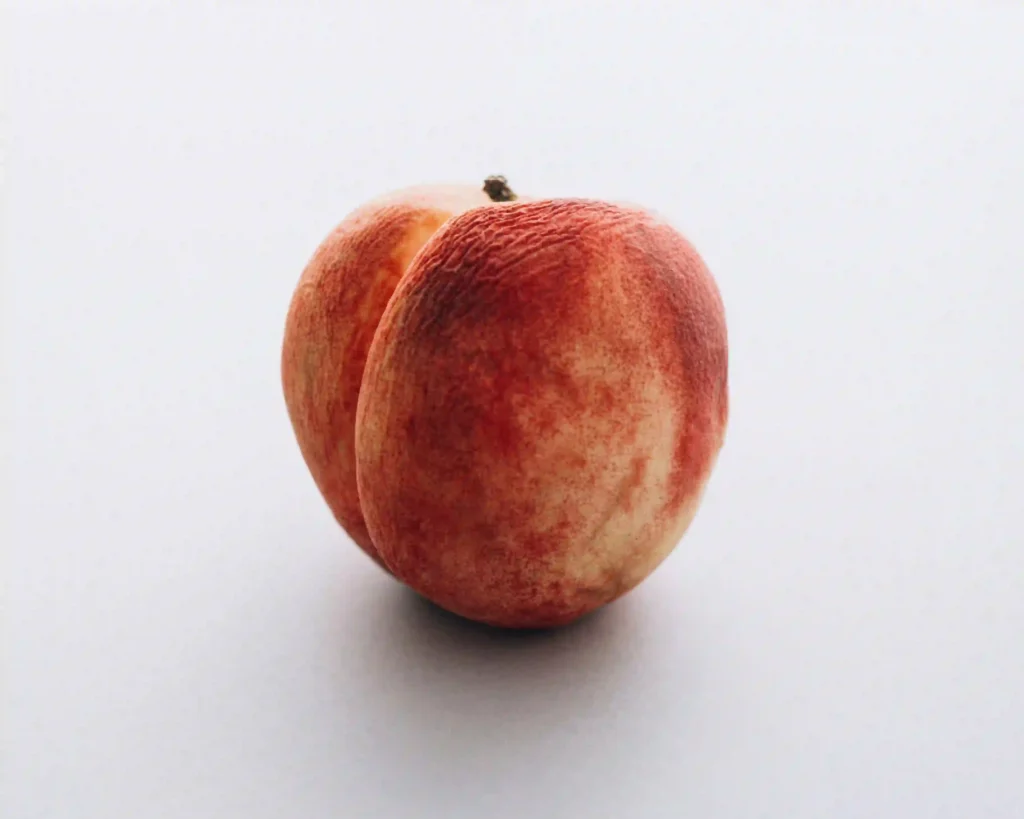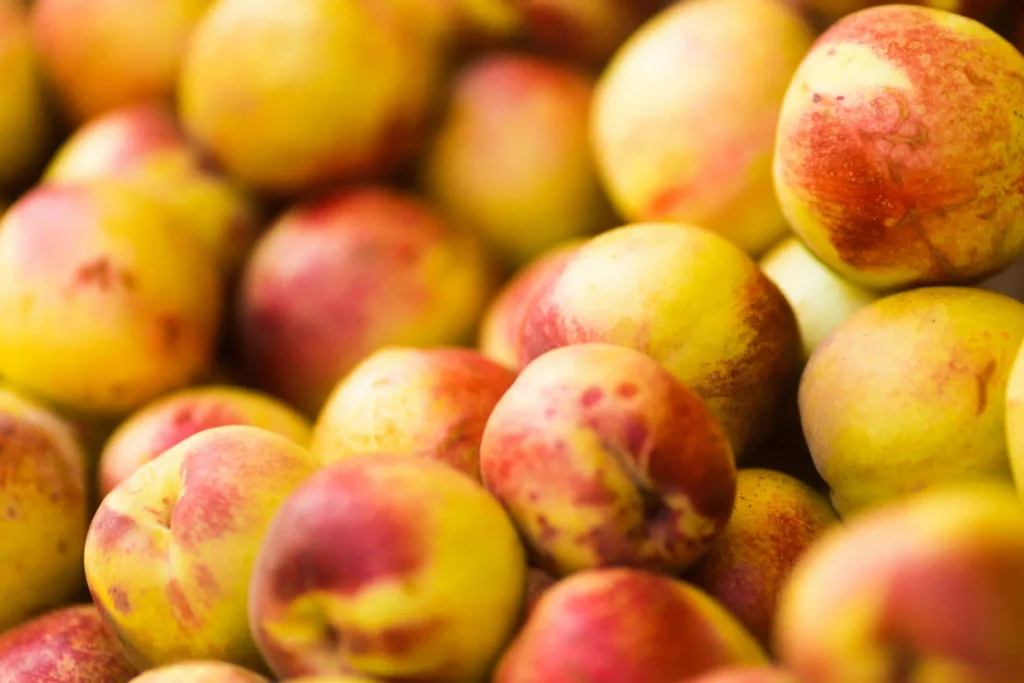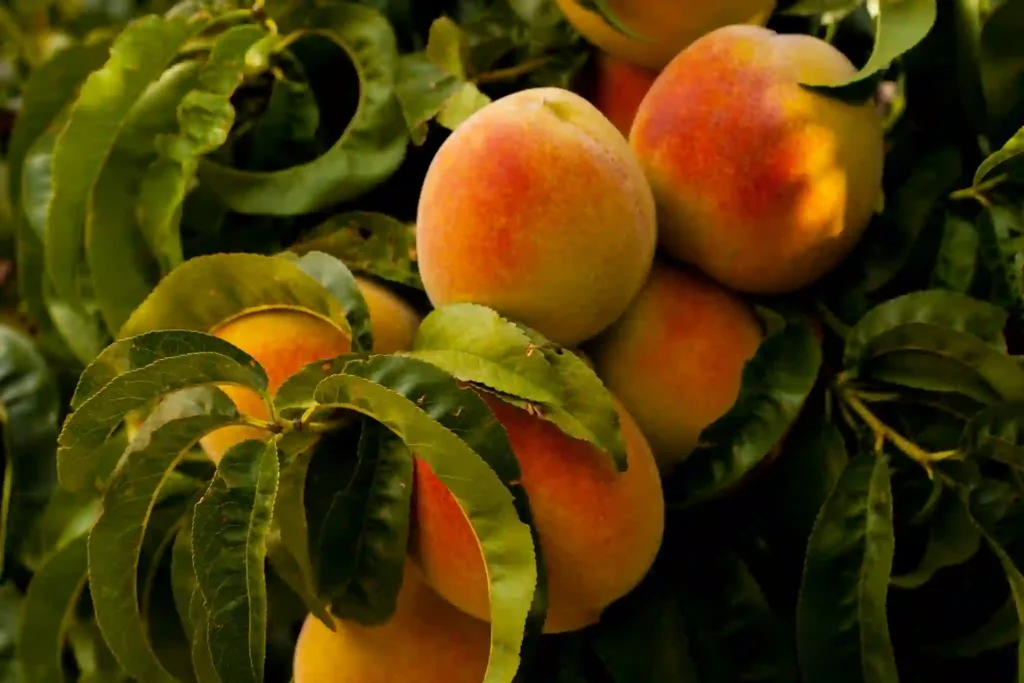Introduction

Peaches are readers’ favorite because of their exquisite flavor profiles and nutrients. However, many people ask themselves whether peaches are constipating or have the ability to help one out with constipation. This post is confined to the aspect of fiber and water content of peaches and how these earning can influence the tummy.
Table of Contents
Can Peach Cause Constipation?
Peaches do not contribute to constipation because they contain high levels of soluble fiber and water both of which encourage regular bowel movements.
Peaches are the water-melons, fruits serve the individuals regularly basis with no strain in the system. They include soluble fiber which swells by absorbing water to maintain softness of the feces and insoluble fiber which bulk up to ease their passage through the colon. This does not constipate most of the time due to the protection given by the combination. Though it is delicious, overconsumption or eating a raw peach could make one have stomach upsets for those with sensitive tummies. Also, fiber consumption recommended that one needs to drink plenty of water to avoid constipation. Clients with certain diseases such as IBS may have these sensations in a different manner. To reduce discomfort, eat fully mature and hence soft and juicy peaches in small portions accompanied with water a a serving of peach should be taken as a dessert.
Do Peaches Help Relieve Constipation or Worsen It?
Many people have reported that peaches help in the prevention of constipation not cause it due to fiber content and mild ability to stimulate bowel movement.
Fruits have always been beneficial but especially peaches can help in the case of mild constipation. They facilitate bowel movement by increasing fecal bulk following their dietary fiber content and counteracts dehydration, a major precipitant of constipation through their inherent water content. Moreover, it is known that peaches contain the so-called sorbitol, this is a natural foreign sugar that has a rather weak coaching nature. Nevertheless, people with fructose intolerance may suffer from mild bloating or gas if they take too much of it. To get the most of peaches, incorporate them to high fiber foods and do not consume unripe peaches because they are difficult to digest. Staying hydrated while eating peaches further improves reliefs from constipation and overall digestive health when matched with other rehydrating foods.
Are Peaches Good for Digestive Health?
Fruits, especially peaches, are very healthy for your digestive tract and one can get full, get enough water and nutrients to allow one to have bowel movement.
Peaches are rich in some nutrients like Vitamin C, potassium and have antioxidant element that has positive impacts to our body. Fiber content in their diet helps to balance their bowels they do not suffer from constipation or diarrhea. The fruit also prevents dehydrated environment in the gut hence a healthy gut environment due to its hydrating factor. Peaches are not strenuous on the stomach and can be consumed by almost everyone including the dieters. The skin that covers the peach has more fiber, hence improving digestion even further. However, for better outcomes, add peaches in a proper diet that has a lot of fiber and probiotic foods to elaborate the positives of the gut more.
Can Peach Fiber Cause Constipation?
Peach fiber often helps in rectal movement and thus does not cause constipation when taken with water.
Fiber is essential for good digestion and, to their credit, peaches contain both soluble and insoluble fiber. Soluble fiber swells to form a gel substance in the colon that makes the stool more usable or easier to pass while insoluble fiber remains comparatively indigestible and help so busy up the colon by increasing the size of the fecal matter. Nevertheless, it it is crucial to note that fiber, if not consumed in combination with much water, results in minor digestion complaints, such as constipation. This is because fiber absorbs moisture in order to perform its required purpose. To prevent this, ensure that you take lots of water when you are taking fiber products such as peaches. With moderate intake, peaches are known to prevent irregular bowel movement and maintain proper digestion, therefore should be included in a people’s meal plan.
Why Do Some People Experience Constipation After Eating Peaches?
A few people consider peaches as one of the causes of constipation because of allergies to peach fiber, lack of sufficient water intake or consumption of green and hard peaches in large proportions.
As a rule, pears have a very positive effect on digestion, but in some cases the fiber found in them can cause constipation especially if one does not consume enough water. Fiber needs moisture to work; he or she can cause constipation if too little water is drunk. Unripe peaches may as well lead to digestive upset as they are not as easily digestible as ripe peaches; they contain less of soluble fiber. Besides, physical eating of peaches in large quantities may fundamentally congest the digestive system resulting to temporaneous disturbances. People with certain gastrointestinal disorders or intolerances may have different feelings about McDonald’s foods. To prevent these problems, take fresh peaches in small portions with a lot of water.
Are Unripe Peaches Linked to Constipation?

Indeed, it is true that unripe peaches might cause constipation by finding it difficult to digest thanks to the fact that it has most of the properties of a ripe fruit.
Green peaches have relatively higher amount of starch on the meat of the fruit as well as comparatively lower soluble fiber contents which are easier for the digestive system to break down. They are also firmer, and this may decrease intestinal motility, and lead to constipation in some persons. Moreover, it was believed that failure in having fully ripened peaches might also disturb the regular bowel movement due to lack of hydrating and laxative nature of peaches. Consuming the fruits when they are unripe can in fact worsen digestion. To eradicate this danger type, it is advised to avoid taking fresh peaches before they achieved the ripe state fully. Mature peaches are not only fresher, but they are softer in texture, have a much better taste and consist of both, fiber and water, which all together make the fruit good for digestion.
Can Peach Juice Help with Constipation?
Peach juice should be sufficient to deal with constipation as its constituent is a natural fruit juice which contains water and natural fructose also known as sorbitol, a mild laxative.
Peach juice is advisable for treating mild constipation since, besides being a liquid, it contains sorbitol, aloe in a small quantity is harmless and has laxative properties as it softens the fecal mass. It should be noted that it does not have as much fiber as the whole fruit and as such it may help people who have somewhat bowel problems by promoting regularity. New peach juice is more advisable since many of its nutrients and natural sugars are not processed as with the processed juices. It is recommended that peach juice should be taken moderately together with lots of fiber and it will provide a greater remedy to constipation. However, excessive intake of some meat may cause upset stomachs for some people and so moderation is the word. You can also learn about Can Peach Cause Diarrhea?.
Do Peaches Have a Laxative Effect or the Opposite?
Peaches are normally mild in their laxative influence because they contain fiber, water and natural sugar such as sorbitol that is help in digestion.
Peaches to your surprise act as a feeble laxative since they contain soluble and insoluble fiber that controls bowel movements. Controlling diarrhea is due to the component that the fruit contains water to help hydrate the digestion system while sorbitol helps in aiding bowel movement. Yet, I was able to find testimonials/observations on more individual levels and they also vary: Even though peaches are commonly known to have a beneficial effect on digestion when eaten in large quantities or in case of an individual intolerance of some of the components they have a negative result providing constipation or bloating. For greatest access to the laxative, always eating ripe peaches with skin on because skin contains nearly all of the peach’s fiber. Lemons are most effective when included in the diet with several other healthy, high-water content, and high fiber diets for better gut health.
Is Peach Skin a Factor in Causing Constipation?
Peach skin is not associated with causing constipation; in fact it contains insoluble fiber which aids digestion.
Peach skin is particularly high in insoluble fiber, a type of fiber that helps make stools firm and bolder and thereby can help prevent constipation. Still, for some persons with some problems to their stomach or even such illnesses as IBS, peach skin may be surprising to digest due to its texture. Secondly, when peach is peeled, the skin is left behind which harbors pesticide or residues that might cause an irritation to the gut. To make the most of the fiber in them but with no ill effect, peaches should always be washed before eating and moderation is encouraged. It’s advisable to incorporate peach skin in our diet since incorporating it has several benefits such as smoother digestion and enhanced bowel movement in most people.
How Many Peaches Should You Eat to Avoid Constipation?
It is important and enough that you take about 1-2 ripe peaches on a daily basis in order to support digestion and avoid constipation.
Peaches have lost its seed which makes it rich in dietary fiber dubiously helpful in maintaining bowel movements. the recommended amount of peaches with no side effects is one to two fully ripe peaches which has enough fiber and water. Nevertheless, consumption of over peaches will surely cause some uneasiness such as swelling or brief alterations in bowels. So the moderation also serves well as is particularly relevant to those with a sensitive stomach. Combine peaches with other sources of fiber and also ensure you take a lot of water for good digestion. Watch the effects it has on the body to know how much is good for you; it is best to avoid using unripe or overripe peaches since the effects on the system cannot be as easily predicted.
Are Peaches Suitable for Constipation Relief in Kids?

Yes, peaches can also be taken by children suffering from constipation, since they contain fiber, water and natural fructose which make them easy on the gut.
Peach is a fruit which children love to take and due to its soft nature it aids in relieving constipation. Their fibers help to ease constipation and the water component helps to soften the colon. Fruits like peaches which contain natural sugars including sorbitol have same laxative effect without being abrasive on the colon. This food is preferred by children particularly because they have soft texture and a tasty sweet nature once ripe. For optimum benefits peaches should be served fresh and sliced and before consumption they should be washed rigorously. Pay attention to amounts, as too much fruit is unhealthy for digestion. Finally, peaches are good parts of children’s balanced diet since they help them achieve a healthy digestion system.
Do Dried Peaches Contribute to Constipation?
Peaches that are dried do not cause constipation because linear density of fiber is more than fresh fruits but they can harm when there is inadequate water intake.
Peaches that have been processed and dried are good sources of dietary fiber, which is important for putting the digestive system in order. However, as they are dry than fresh peaches their consumption may pose a problem of digestion particularly if more are consumed without enough water. Depending on their composition, their fiber might be counterproductive due to the lack of water they might cause constipations. Besides, it is important to note that some of the peach, which is commercially dried may contain sugars added to it; an input, which may be bad news to the gut. If one wants to use dried peaches for digestion, they should take foods in moderation, consider taking water together with the peaches and take unsweetened peaches when taking the fruits. When consumed in moderation together with adequate water intake they are a very good substitute for fresh peaches.
Are Peaches Safe for People with Chronic Constipation?
Yes, peaches are generally alright for people with chronic constipation since they contain fiber, water, and low glycemic fruit sugars.
The peach in specific is a good choice when it comes to chronic constipation because of both soluble and insoluble fiber. The peaches in this smoothie contain a good amount of fiber which makes stool bulkier and promotes regular bowel movements; sorbitol, which is a natural sugar, works in a similar ways as bulk forming laxative. Peaches also contain a lot of water therefore they make people take more water that leads to production of soft stools. In cases of devastating chronic constipation, consumption of fresh ripe peaches has been labeled safe for use to reveal constipation symptoms. However, people should not take raw or processed peaches since they can have a similar effect on the digestive system. It becomes important to see that the peaches’ health benefits are even more pronounced when they are accompanied by sufficient water intake and other fiber-rich foods making it a good fit for the constipation relief diet.
How to Eat Peaches to Prevent Digestive Issues Like Constipation?
Ripe peaches should be eaten with skin on without including them in further cooking processes and drinking the adequate water.
These facts having been said, it is important to note that the approach to eating peaches can go a long way toward helping the digestive system. To avoid a big problem, be sure to select ripe peaches, as they will not only be easy to digest, but will also offer the best fiber. It is advisable to consume them with skin since skin has heath benefiting insoluble fiber that aids in digestion. In order of consumption, it is recommended to wash peaches thoroughly because of certain chemical residues. Using peaches in meals as those in salads and smoothies makes a change and provides nutrition. The best combo is to eat peaches with a glass of water since fiber requires water to do its job. Consume peaches in moderation as too much of fiber or sugar may cause iatrogenic diarrhea. Correct preparation and Measurement help in making peaches a reliable product in the prevention of constipation.
Conclusion
Specifically, peaches are a tasty fruit that is nutritious and may be good for the stomach when taken rightly. If used as a stool softener by a person suffering from constipation, they have effects such as side effects depending on ripeness, portion size, manner of preparation among others. Loaded with dietary fiber and water, peaches can eliminate constipation and improve bowel movement, provided the fruit is taken fresh with the rind. Still, unripe or dried peaches may lead to digestive issues for others experiencing it, though they can be rolling occasionally. Only consumption of peach as a part of nutritious meal and adequate intake of water will permit the appreciation of its natural sugars with steady and healthy assimilation. Regardless of whether it is consumed fresh, as juice, or as an ingredient in a dish, peaches continue to offer lots of value in the effort to combat constipation.